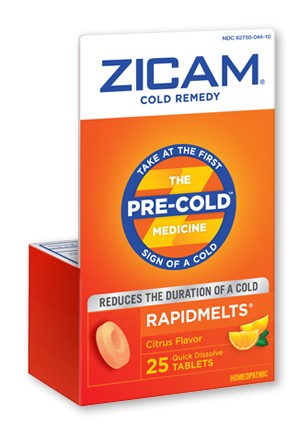
Zicam
USINFO | 2014-02-12 10:04

Zicam is a branded series of products marketed for cold and allergy relief whose original formulations included the element zinc. The Zicam name is derived from a combination of the words "zinc" and "ICAM-1" (the receptor to which a rhinovirus binds in order to infect cells). It is marketed as an "unapproved homeopathic" product.
Zicam was invented by Robert S. Davidson and Charles B. Hensley in the mid 1990s and is produced, marketed and sold by Zicam, LLC, a wholly owned subsidiary of Matrixx Initiatives, Inc.,an American over-the-counter drug company. In 2009, the U.S. Food and Drug Administration (FDA) advised consumers to avoid intranasal versions of Zicam Cold Remedy because of a risk of damage to the sense of smell, leading the manufacturer to withdraw these versions from the U.S. market. The Zicam brand has been expanded to include non-zinc formulations.
Ingredients and use
The only biologically active ingredients present in Zicam Cold Remedy are slightly diluted zinc acetate (2X = 1/100 dilution) and zinc gluconate (1X = 1/10 dilution); the product's other originally active ingredients have been serially diluted to the point that Zicam should no longer contain any molecules of those ingredients, and are listed as "inactive ingredients" on the label.Zicam is marketed as an "unapproved homeopathic" product;Some of the homeopathic ingredients used in the preparation of Zicam are galphimia glauca, histamine dihydrochloride (homeopathic name, histaminum hydrochloricum),luffa operculata, and sulfur.
Ionic zinc is proposed to interfere with the binding of rhinovirus to its cellular receptor, ICAM-1.Some research suggests that zinc-based remedies may reduce the duration of the common cold and reduce the severity of cold symptoms. Another study indicates that zinc-based remedies can relieve symptoms of hay fever and other upper respiratory allergies.
A 2003 review in the Journal of the American Pharmacists Association reported that the majority of studies supported the value of zinc in reducing the duration and severity of symptoms of the common cold when administered within 24 hours of the onset of common cold symptoms.
A systematic review published in 2006 in Clinical Infectious Diseases found that many of the studies of zinc in the common cold suffered from methodologic flaws; restricting the analysis to well designed studies, the authors concluded that the therapeutic effectiveness of zinc lozenges has yet to be established.
A 2011 systematic meta analysis of studies conducted by the Cochrane Collaboration indicates that zinc lozenges definitively shorten the duration and severity of cold symptoms but offers no recommendations as to dosage. Many over the counter zinc medications may be less effective or ineffective because they do not contain the optimum mix of ingredients. The zinc gluconate and zinc acetate salts may be better absorbed by the human body than other zinc salts.This variety of formulations has also been implicated in the prior lack of success in determining the effectiveness of zinc medicines. Methodological weaknesses are also thought to have contributed to the mixed results of previous studies (see below). The 2011 Cochrane review is widely regarded as the most authoritative assessment to date of the effectiveness of zinc as a treatment for the common cold.It is suspected that zinc gluconate lozenges shorten the duration of cold symptoms by reducing inflammatory cytokines.
Safety concerns
Litigation
In 2006, Matrixx Initiatives paid $12 million to settle 340 lawsuits from Zicam users who said that the product destroyed their sense of smell(medically termed anosmia), although the company did not admit fault.As of 2009, "hundreds more such suits have since been filed."
FDA warning and product recall
On June 16, 2009, the FDA advised consumers to discontinue use of three nasally administered versions of Zicam Cold Remedy—Zicam Cold Remedy Nasal Gel, Zicam Cold Remedy Nasal Swabs, and Zicam Cold Remedy Swabs, Kids Size (a discontinued product)—because the FDA had associated a serious risk of anosmia with them.The advisory did not implicate other Zicam products. The FDA indicated that it had received reports of a loss of smell from approximately 130 Zicam Cold Remedy users since 1999. The FDA voiced concern that the loss of smell may be long-lasting or permanent, while the condition for which these Zicam products are marketed—the common cold—typically resolves on its own without lasting problems.The manufacturer stated that it had received an additional 800 reports of a loss of smell, but did not turn those over to the FDA as they did not feel they were required to do so.The FDA disagreed, and requested copies of any reports that had associated anosmia with intranasal Zicam Cold Remedy.
The FDA also issued a Warning Letter to Matrixx, stating that the products cannot be marketed without FDA approval. The company initially refused to recall the products but later said that they would withdraw the products from sale and that, "based on the FDA’s recommendation, consumers should discard any unused product or contact Zicam ... to request a refund."On June 24, 2009, Matrixx recalled all affected products. The company maintained that most cases of anosmia are due to the common cold itself, and that complaints of anosmia among Zicam Cold Remedy users are unlikely to be more numerous than those expected among the general population.In contrast, the FDA had reported that cases of anosmia associated with intranasal Zicam Cold Remedy products were in excess of those seen with other nasal remedies for the common cold, and that cases associated with intranasal zinc presented more rapidly, and with different symptoms, than did unrelated cases.
In addition, the FDA's warning letter prompted the Securities and Exchange Commission to investigate the company. Through Freedom of Information Act (FOIA) filings, Matrixx has requested the FDA to provide the research and evidence that led them to request the withdrawal of Zicam swabs. The company said that "fundamental fairness" required a clear explanation of the FDA's methodology and analysis.
On June 19, 2009 Health Canada, in a foreign product alert, also issued a similar warning based on the U.S. FDA information.
Share this page



















